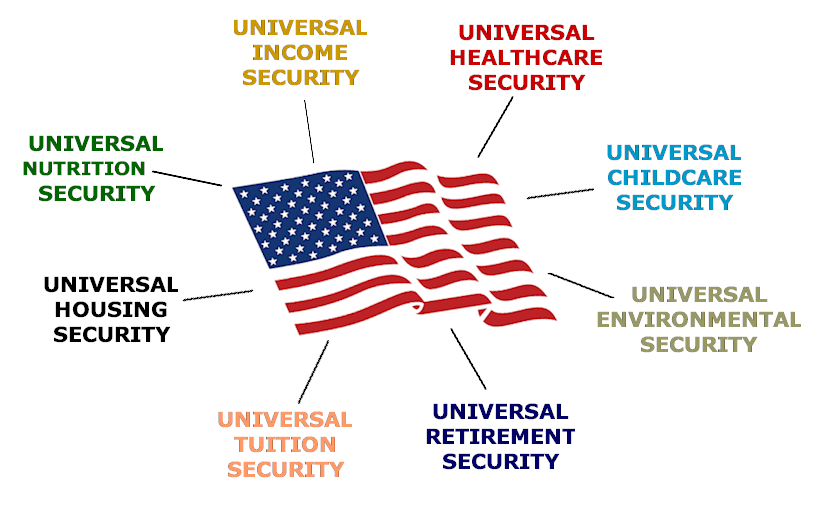|
|
Opinion |
|
|
|
Guaranteed Income Programs
- Axios - January 21,2021 |
|
Ezra Klein:
Help People Fast - New York Times - January
21, 2021 |
|
|
|
|
|
7 principles for a post-coronavirus economy
Henry M. Paulson |
| |
| 1. Our economic model should protect
those most in need. We must
significantly upgrade our social safety net
while maintaining incentives to work.
Without a job, millions of Americans lack
the savings to meet next month’s rent or
mortgage payment without government
assistance. When workers such as those in
the hospitality sector have an annual
average income of only $20,000, lectures
about the need to save are ineffective.
We
need a more robust system of supplemental income and monthly food, rent and health
insurance assistance. |
| |
| 2. State-of-the-art infrastructure is
essential to economic competitiveness.
It’s time for a modern-day domestic
Marshall Plan that includes massive
government and private investment to rebuild
and create the infrastructure of the
future. This program can play an important
role in spurring the recovery, creating jobs
and giving the market a lift. But it must be
future-oriented, not only repairing and
maintaining roads and bridges but also
investing and making regulatory changes to
create a best-in-class national digital
infrastructure. |
| |
| 3. Human capital is what
differentiates us. To bolster the
productivity and resilience of our economy,
we need big, smart, forward-looking
investments in education. We must commit
more public dollars and resources to support
institutions of higher education and to
foster a workforce that has the skills to be
innovators, business builders and job
creators. We also need an immigration policy
that attracts, educates and trains the best
minds from around the world. |
| |
| 4. Protectionism will destroy our
competitiveness. Trade fosters
American competitiveness and innovation. We
need to strengthen our investment in trade
linkages rather than retreat into
self-destructive isolationism. |
| |
| 5. Our environment is vital to
long-term prosperity. We need to
protect the clean air, water and
biodiversity that are essential to our
long-term economic prosperity and implement
policies and investments to mitigate the
economic risk of climate change. As a start,
it’s time to adapt our policies and build
the infrastructure to withstand the
weather-driven shocks that are a short-term
certainty. |
| |
| 6. Capital is the lifeblood of the
economy. We must nurture
best-in-class capital markets with a
regulatory and oversight regime that ensures
financial stability and consumer protection
while encouraging the innovation that has
made them the envy of the world. Capital
markets, ranging from venture capital firms
to leading global banks and asset managers,
facilitate economic growth by financing
businesses that create jobs and support
American families. |
| |
| 7. Massive debt will cripple our
ability to achieve long-term prosperity. The
aim of the recovery must be to get more
Americans working, spending and paying
taxes. When the recovery is behind us, we
will have to begin the long but essential
process of reducing our national debt. It
makes sense in the short term, while
interest rates are so low and the need so
great, to fund strategic investments with
long-term debt. But in the end, more revenue
will be necessary, and wealthier Americans
will have to pay higher taxes. A major
overhaul of our tax system can raise
substantial revenue without hurting
competitiveness. And we can reduce federal
expenditures if we make reforms, such as
fixing our inefficient and expensive
health-care system |
| |
| source:
Washington Post |
| |
| Comment by |
Broad words of wisdom from a financial
oracle, but no concrete plan. My plan:
1) eliminate the carried interest (extremely
low tax rate) on hedge fund and other
passive (non wage earnings).
2) eliminate all tax deductions for second
residential homes.
3) eliminate the cap on social security
income limits. A high earner (> $128K) needs
to continue to be taxed on their income.
4) tax investment income (dividends, Capital
gains) at the same rate as wages.
5) prohibit stock buy backs by corporations.
This practice was illegal and considered
stock manipulation up until the 1980’s.
Thanks Ronnie!
6) cap CEO pay at a low multiple of the mean
wage earner (20%). There is no current upper
limit.
7) reinstate the SUPERFUND tax to pay for
environmental cleanup.
8) eliminate the corporate welfare depletion
allowance for petroleum
exploration/extraction.
9) update the mining laws (vintage 1864 era)
to tax mineral producers at market rates.
10) provide STEM scholarships to quality
(aptitude-tested/proven) students. |
| |
|
| |
| |
Beginning in the 1980’s, the private
sector began an effort that continues to
this day to reduce the proportion of the
cost of selling goods and services
attributed to labor. This takes many forms,
including limiting wage growth, outsourcing,
union busting, sending jobs overseas,
transferring jobs to right-to-work states,
increasing the ratio of part-time to
full-time employees, not translating
workplace productivity gains into wage
increases, shifting more health care costs
to employees, ending defined benefit
pensions, reducing employer contributions to
defined contribution pensions and switching
to once-a-year, lump sum contributions,
classifying employees as independent
contractors to avoid paying benefits and
workingman’s compensation contributions,
increasing the number of unpaid internships,
hiring new workers through temp agencies,
requiring employees to sign non-compete
agreements, and layoffs, not only during
recessions, but also after mergers and
acquisitions. Non-cyclical layoffs have
become a permanent feature of the new
economy.
Economic marginalization of ordinary working
Americans in the private sector is once
again a core organizing principle of
American conservatism.
“The cure for capitalism's failing would
require that a government would have to rise
above the interests of one class alone.”
- Robert L. Heilbroner, American economist,
(1919 – 2005) |
| |
|
| |
| |
|
|
 |
|
|
|
|
|
|
|
 |
|
|
|
|
|
![]()